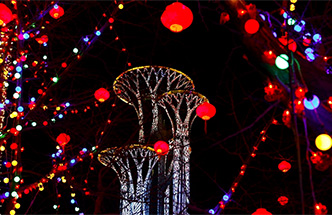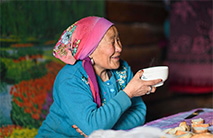Photo story: A embroiderer's New Year wish

Yang Mei (R) introduces the cloth for ethnic garment to a customer (C) at her garment factory in Kaili, southwest China's Guizhou Province, Jan. 30, 2022. Kaishao Village, embroiderer Yang Mei's hometown, used to be impoverished due to its poor soil and limited transport conditions. Lots of villagers here chose to work as immigrant workers in other places. In 2016, thanks to local poverty alleviation policies, Yang Mei's family got a chance to move to their new home at a relocation site in Kaili. With the help from skill training sessions and supportive funding from government, Yang started her own business by establishing a garment factory in 2018. The factory makes local ethnic clothing, work outfits and dancing clothes. Currently, the factory has employed about 100 relocated people. She also initiated an embroidery cooperative, aiming to help boost the incomes of those embroiders who have to work from home. When it comes to her New Year wish, Yang hopes her business can grow bigger and all her relocated fellows' incomes continue to increase in the Year of the Tiger. (Xinhua/Yang Wenbin)
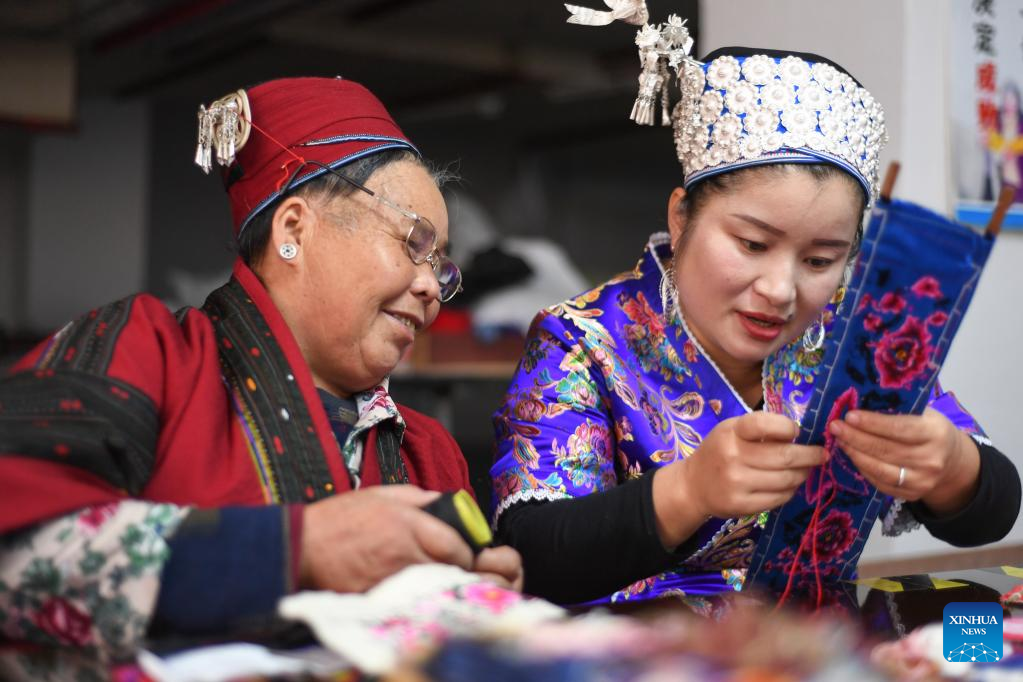
Yang Mei (R) works on a piece of embroidery with an embroiderer at a relocation site in Kaili, southwest China's Guizhou Province, Oct. 18, 2020. Kaishao Village, embroiderer Yang Mei's hometown, used to be impoverished due to its poor soil and limited transport conditions. Lots of villagers here chose to work as immigrant workers in other places. In 2016, thanks to local poverty alleviation policies, Yang Mei's family got a chance to move to their new home at a relocation site in Kaili. With the help from skill training sessions and supportive funding from government, Yang started her own business by establishing a garment factory in 2018. The factory makes local ethnic clothing, work outfits and dancing clothes. Currently, the factory has employed about 100 relocated people. She also initiated an embroidery cooperative, aiming to help boost the incomes of those embroiders who have to work from home. When it comes to her New Year wish, Yang hopes her business can grow bigger and all her relocated fellows' incomes continue to increase in the Year of the Tiger. (Photo by Cai Xingwen/Xinhua)
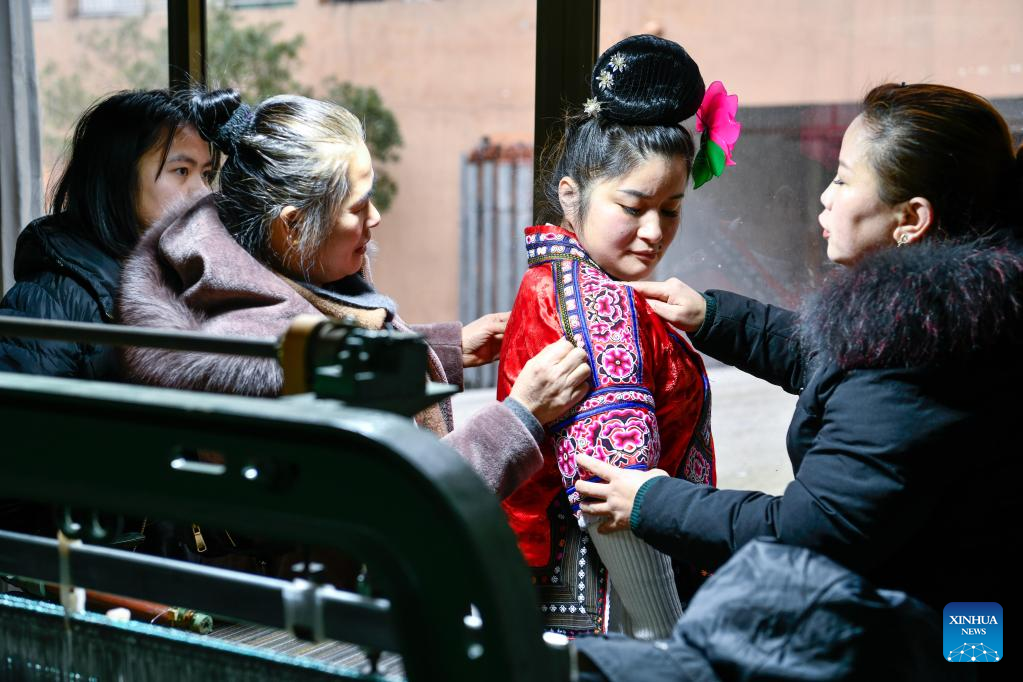
Yang Mei (2nd, R) and a staff member (1st, R) give details about their embroidery to customers at a garment factory in Kaili, southwest China's Guizhou Province, Jan. 30, 2022. Kaishao Village, embroiderer Yang Mei's hometown, used to be impoverished due to its poor soil and limited transport conditions. Lots of villagers here chose to work as immigrant workers in other places. In 2016, thanks to local poverty alleviation policies, Yang Mei's family got a chance to move to their new home at a relocation site in Kaili. With the help from skill training sessions and supportive funding from government, Yang started her own business by establishing a garment factory in 2018. The factory makes local ethnic clothing, work outfits and dancing clothes. Currently, the factory has employed about 100 relocated people. She also initiated an embroidery cooperative, aiming to help boost the incomes of those embroiders who have to work from home. When it comes to her New Year wish, Yang hopes her business can grow bigger and all her relocated fellows' incomes continue to increase in the Year of the Tiger. (Xinhua/Yang Wenbin)
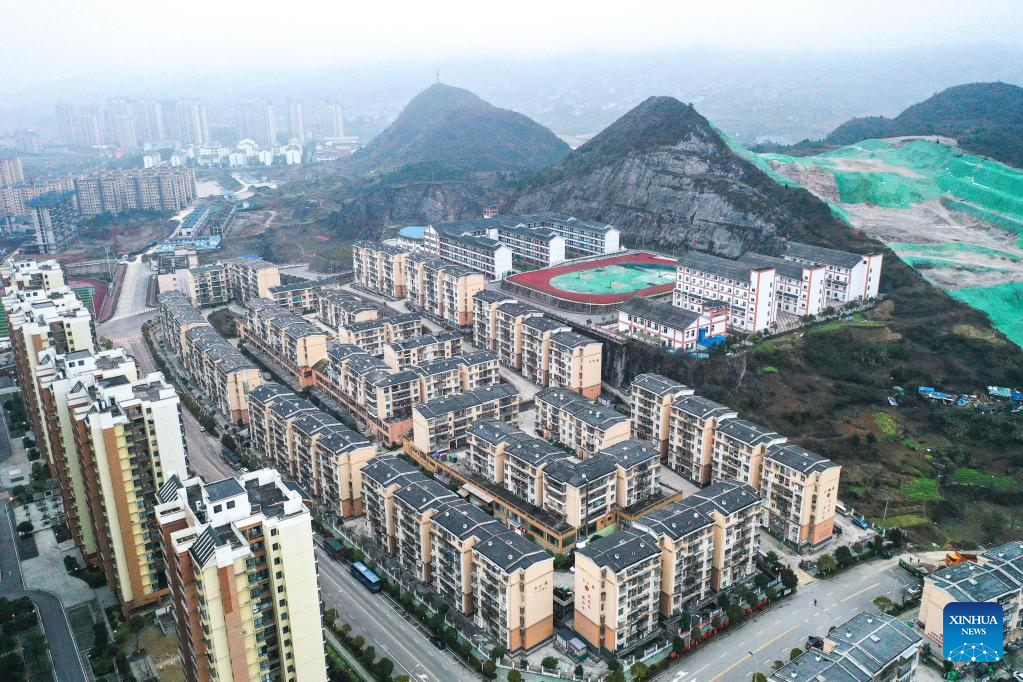
Aerial photo taken on Jan. 30, 2022 shows a relocation site in Kaili, southwest China's Guizhou Province. Kaishao Village, embroiderer Yang Mei's hometown, used to be impoverished due to its poor soil and limited transport conditions. Lots of villagers here chose to work as immigrant workers in other places. In 2016, thanks to local poverty alleviation policies, Yang Mei's family got a chance to move to their new home at a relocation site in Kaili. With the help from skill training sessions and supportive funding from government, Yang started her own business by establishing a garment factory in 2018. The factory makes local ethnic clothing, work outfits and dancing clothes. Currently, the factory has employed about 100 relocated people. She also initiated an embroidery cooperative, aiming to help boost the incomes of those embroiders who have to work from home. When it comes to her New Year wish, Yang hopes her business can grow bigger and all her relocated fellows' incomes continue to increase in the Year of the Tiger. (Xinhua/Yang Wenbin)
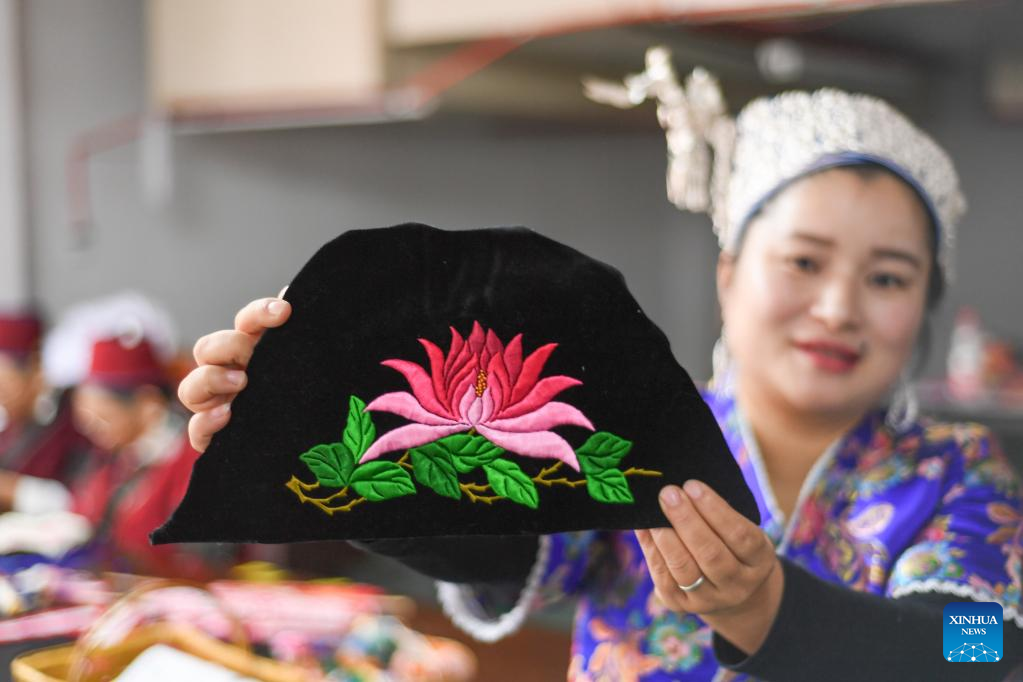
Yang Mei shows a piece of works made by an embroidery cooperative in Kaili, southwest China's Guizhou Province, Oct. 18, 2020. Kaishao Village, embroiderer Yang Mei's hometown, used to be impoverished due to its poor soil and limited transport conditions. Lots of villagers here chose to work as immigrant workers in other places. In 2016, thanks to local poverty alleviation policies, Yang Mei's family got a chance to move to their new home at a relocation site in Kaili. With the help from skill training sessions and supportive funding from government, Yang started her own business by establishing a garment factory in 2018. The factory makes local ethnic clothing, work outfits and dancing clothes. Currently, the factory has employed about 100 relocated people. She also initiated an embroidery cooperative, aiming to help boost the incomes of those embroiders who have to work from home. When it comes to her New Year wish, Yang hopes her business can grow bigger and all her relocated fellows' incomes continue to increase in the Year of the Tiger. (Photo by Cai Xingwen/Xinhua)

Yang Mei (1st, R) talks with workers at her garment factory in Kaili, southwest China's Guizhou Province, Oct. 18, 2020. Kaishao Village, embroiderer Yang Mei's hometown, used to be impoverished due to its poor soil and limited transport conditions. Lots of villagers here chose to work as immigrant workers in other places. In 2016, thanks to local poverty alleviation policies, Yang Mei's family got a chance to move to their new home at a relocation site in Kaili. With the help from skill training sessions and supportive funding from government, Yang started her own business by establishing a garment factory in 2018. The factory makes local ethnic clothing, work outfits and dancing clothes. Currently, the factory has employed about 100 relocated people. She also initiated an embroidery cooperative, aiming to help boost the incomes of those embroiders who have to work from home. When it comes to her New Year wish, Yang hopes her business can grow bigger and all her relocated fellows' incomes continue to increase in the Year of the Tiger. (Photo by Cai Xingwen/Xinhua)
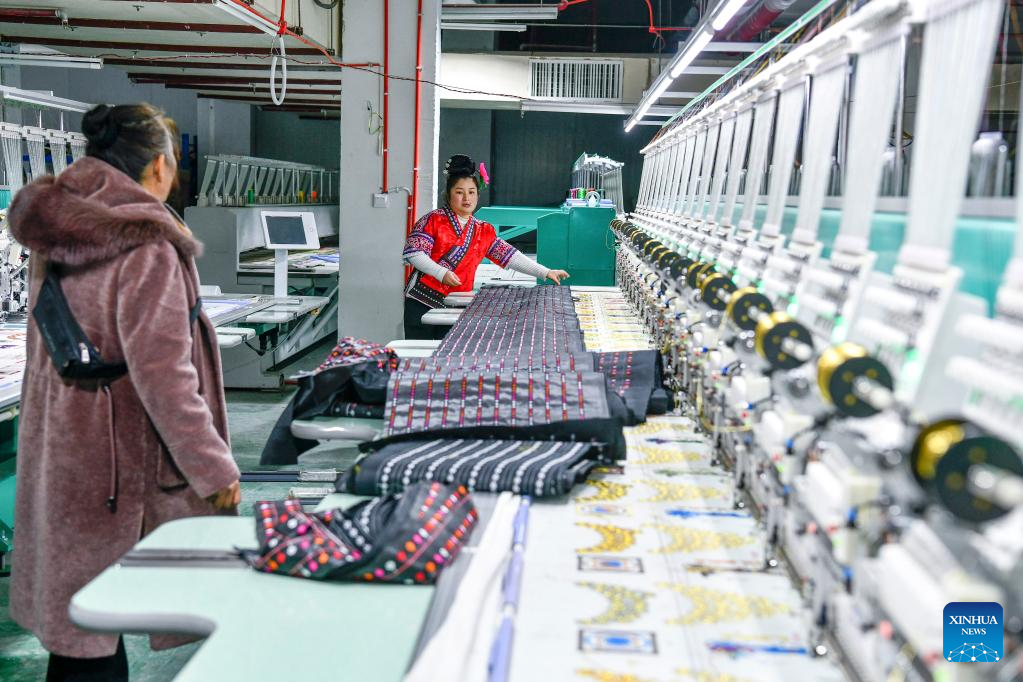
Yang Mei (R) introduces cloth to a customer at her garment factory in Kaili, southwest China's Guizhou Province, Jan. 30, 2022. Kaishao Village, embroiderer Yang Mei's hometown, used to be impoverished due to its poor soil and limited transport conditions. Lots of villagers here chose to work as immigrant workers in other places. In 2016, thanks to local poverty alleviation policies, Yang Mei's family got a chance to move to their new home at a relocation site in Kaili. With the help from skill training sessions and supportive funding from government, Yang started her own business by establishing a garment factory in 2018. The factory makes local ethnic clothing, work outfits and dancing clothes. Currently, the factory has employed about 100 relocated people. She also initiated an embroidery cooperative, aiming to help boost the incomes of those embroiders who have to work from home. When it comes to her New Year wish, Yang hopes her business can grow bigger and all her relocated fellows' incomes continue to increase in the Year of the Tiger. (Xinhua/Yang Wenbin)
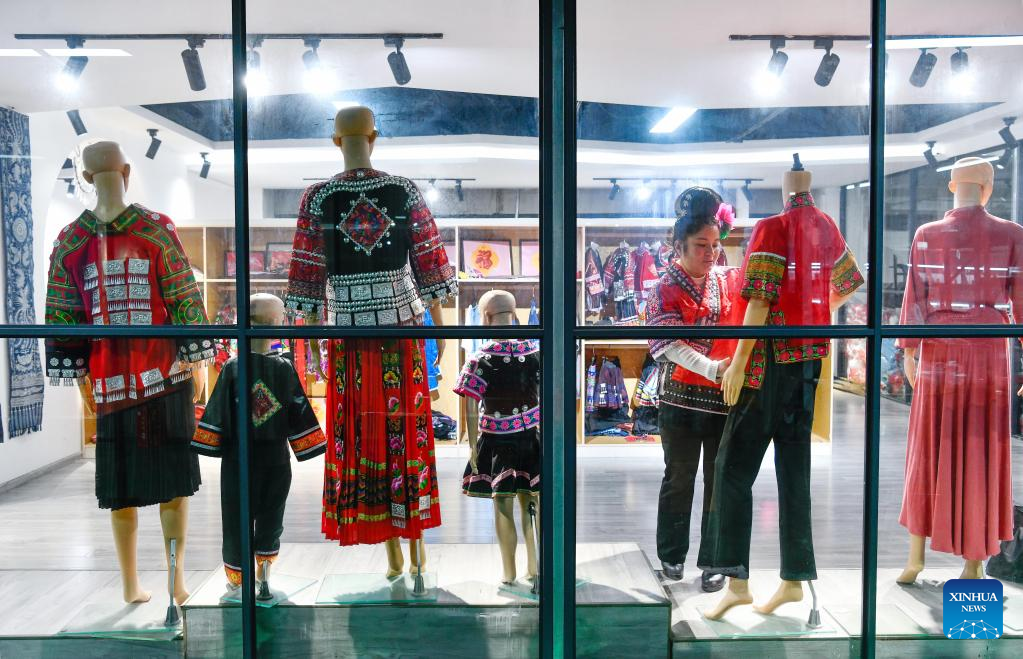
Yang Mei arranges clothes on models at her garment factory in Kaili, southwest China's Guizhou Province, Jan. 30, 2022. Kaishao Village, embroiderer Yang Mei's hometown, used to be impoverished due to its poor soil and limited transport conditions. Lots of villagers here chose to work as immigrant workers in other places. In 2016, thanks to local poverty alleviation policies, Yang Mei's family got a chance to move to their new home at a relocation site in Kaili. With the help from skill training sessions and supportive funding from government, Yang started her own business by establishing a garment factory in 2018. The factory makes local ethnic clothing, work outfits and dancing clothes. Currently, the factory has employed about 100 relocated people. She also initiated an embroidery cooperative, aiming to help boost the incomes of those embroiders who have to work from home. When it comes to her New Year wish, Yang hopes her business can grow bigger and all her relocated fellows' incomes continue to increase in the Year of the Tiger. (Xinhua/Yang Wenbin)
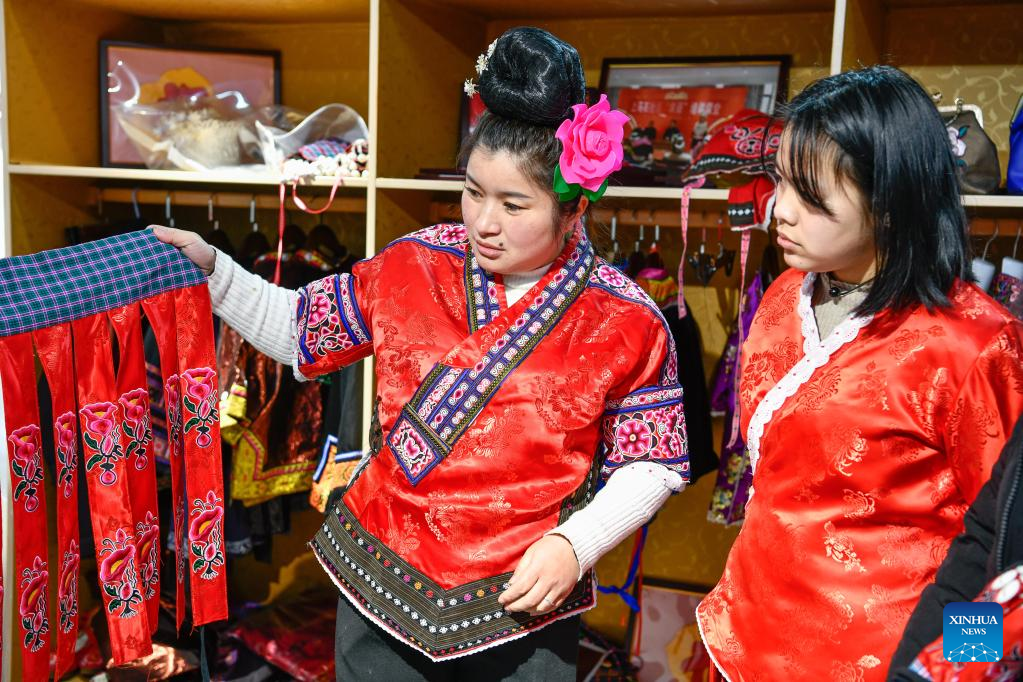
Yang Mei (L) recommends ethnic clothes to a customer at her garment factory in Kaili, southwest China's Guizhou Province, Jan. 30, 2022. Kaishao Village, embroiderer Yang Mei's hometown, used to be impoverished due to its poor soil and limited transport conditions. Lots of villagers here chose to work as immigrant workers in other places. In 2016, thanks to local poverty alleviation policies, Yang Mei's family got a chance to move to their new home at a relocation site in Kaili. With the help from skill training sessions and supportive funding from government, Yang started her own business by establishing a garment factory in 2018. The factory makes local ethnic clothing, work outfits and dancing clothes. Currently, the factory has employed about 100 relocated people. She also initiated an embroidery cooperative, aiming to help boost the incomes of those embroiders who have to work from home. When it comes to her New Year wish, Yang hopes her business can grow bigger and all her relocated fellows' incomes continue to increase in the Year of the Tiger. (Xinhua/Yang Wenbin)

Yang Mei (R) pastes couplets at her home in Kaili, southwest China's Guizhou Province, Jan. 30, 2022. Kaishao Village, embroiderer Yang Mei's hometown, used to be impoverished due to its poor soil and limited transport conditions. Lots of villagers here chose to work as immigrant workers in other places. In 2016, thanks to local poverty alleviation policies, Yang Mei's family got a chance to move to their new home at a relocation site in Kaili. With the help from skill training sessions and supportive funding from government, Yang started her own business by establishing a garment factory in 2018. The factory makes local ethnic clothing, work outfits and dancing clothes. Currently, the factory has employed about 100 relocated people. She also initiated an embroidery cooperative, aiming to help boost the incomes of those embroiders who have to work from home. When it comes to her New Year wish, Yang hopes her business can grow bigger and all her relocated fellows' incomes continue to increase in the Year of the Tiger. (Xinhua/Yang Wenbin)

Yang Mei buys commodities for the upcoming Spring Festival in Kaili, southwest China's Guizhou Province, Jan. 30, 2022. Kaishao Village, embroiderer Yang Mei's hometown, used to be impoverished due to its poor soil and limited transport conditions. Lots of villagers here chose to work as immigrant workers in other places. In 2016, thanks to local poverty alleviation policies, Yang Mei's family got a chance to move to their new home at a relocation site in Kaili. With the help from skill training sessions and supportive funding from government, Yang started her own business by establishing a garment factory in 2018. The factory makes local ethnic clothing, work outfits and dancing clothes. Currently, the factory has employed about 100 relocated people. She also initiated an embroidery cooperative, aiming to help boost the incomes of those embroiders who have to work from home. When it comes to her New Year wish, Yang hopes her business can grow bigger and all her relocated fellows' incomes continue to increase in the Year of the Tiger. (Xinhua/Yang Wenbin)
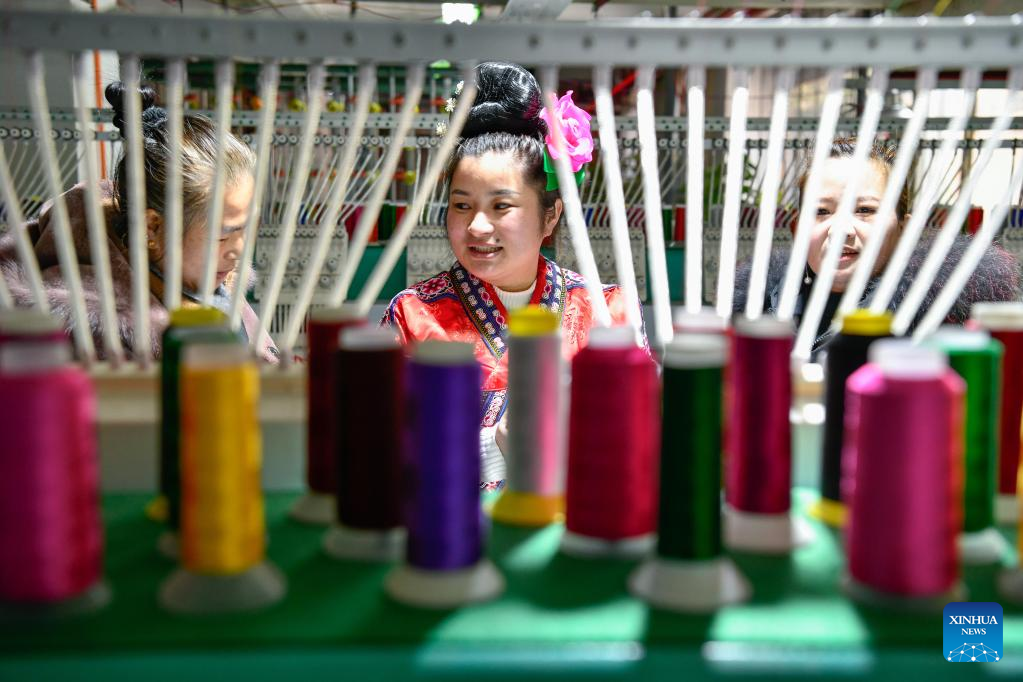
Yang Mei (C) introduces materials for ethnic clothing to a customer (L) at her garment factory in Kaili, southwest China's Guizhou Province, Jan. 30, 2022. Kaishao Village, embroiderer Yang Mei's hometown, used to be impoverished due to its poor soil and limited transport conditions. Lots of villagers here chose to work as immigrant workers in other places. In 2016, thanks to local poverty alleviation policies, Yang Mei's family got a chance to move to their new home at a relocation site in Kaili. With the help from skill training sessions and supportive funding from government, Yang started her own business by establishing a garment factory in 2018. The factory makes local ethnic clothing, work outfits and dancing clothes. Currently, the factory has employed about 100 relocated people. She also initiated an embroidery cooperative, aiming to help boost the incomes of those embroiders who have to work from home. When it comes to her New Year wish, Yang hopes her business can grow bigger and all her relocated fellows' incomes continue to increase in the Year of the Tiger. (Xinhua/Yang Wenbin)
Photos
Related Stories
- Feature: "The Sound of Spring" concert in New York presents music that transcends cultures
- (Poster) Chinese New Year tradition: setting off firecrackers
- Iran's iconic tower flashes red for Chinese New Year
- Taikonauts from space greet Chinese on Lunar New Year
- U.S. media extoll Chinese New Year as new page opens on lunar calender
- A bite of the Spring Festival at dumpling restaurant in Beijing
- In pics: Chinese Lunar New Year celebration in London, Britain
- Feel the Spring Festival vibe in Chinese street markets
Copyright © 2022 People's Daily Online. All Rights Reserved.







